Fleurs du Mal Magazine


Or see the index
14.01.2016 – Worldwide Reading of selected poems and other texts in support of Ashraf Fayadh.
The international literature festival Berlin (ilb) calls on all individuals, institutions, schools and media outlets that care about justice and freedom to participate in a worldwide reading of selected poems and other texts in support of Ashraf Fayadh, on 14 January 2016.
Ashraf Fayadh, a 35 year-old Palestinian poet and art curator, who lives in Saudi Arabia, has been sentenced to death by a Saudi court on 17 November 2015 for the “crime” of apostasy. He was denied access to a lawyer throughout his detention and trial.

Frida Kahlo’s Moustache
I will ignore the smell of clay, the reproach of rain, and the choke that has long settled in my chest
and I will search for an appropriate condolence of my situation that doesn’t permit me
to explain your lips in the manner I’d hoped for
or to shake dew drops off your reddish petals
or to lessen the intensity of the obsession that overwhelms me whenever I realize
you’re not next to me now and won’t be…I’m forced to justify my position
to the silence that night punishes me with
Pretend that the earth is silent, just as we see it from afar,
and that all what happened between us was no more
than a poor prank that shouldn’t have gone this far
What’s your idea about the days I usually spend without you?
about my words that used to rapidly evaporate
about my heavy pain
and the knots that had sedimented inside my thorax like dried up algae
I forgot to tell you…that in the practical sense of the word
I’ve grown used to your absence
and that my wishes have lost their way to your desires
and my memory has begun to corrode
And that I still chase light, not because I want to see…the dark always frightens
even when we’re used to it
Is my apology for everything that happened while I was trying
to make up excuses for you enough?
Is it enough for the times jealousy raged in some place inside me
or when disappointment ruined yet another of my dark days
And for my repetition that justice will always suffer the disturbances of menstruation
and that love is a backward impotent man at the end of his days
I will be forced to trick my memory
and pretend that I have no problem sleeping
and rip all the remaining questions
the questions that now search for persuasive answers
after all punctuation has been dropped
for purely personal reasons
Let the mirror explain to you how beautiful you are
Remove my pile of dust, my words
Breathe deeply, remember how much I loved you and how
the whole thing turned into a brief electrocution
that almost caused a great fire in an empty warehouse
The sun is extremely polite when it comes to covering her mouth while yawning
The sun doesn’t know how to impose its total control over the earth
the same fate the sun has with darkness, the sun
has no choice but to resist the dark, even if Pluto
has lost its qualifications to remain among the vertiginous planets
The moon has a different take on imposing its will over the sea
And the sea can swallow whatever creatures it desires and lay claim to more land
on account of global warming, the punctured ozone, a woman’s right
to wear a bikini, and the temptation of birds with the riches of fish
I will no longer be pain pills for your monthly period
and won’t enjoy your exceptional conversation while you prepare for a long nap
or when you want to offload your anger
or while you spend some lovely time in a bar packed with lovers of Jazz
I won’t be able to sleep enough or explain Nietzsche’s moustache
or persuade you that Imad’s work is a unique experiment in art
I will busy myself with normalizing relations between earth and water
in order to obstruct fire on its way to becoming an ambassador of good will
Only then will the air cease to appear presentable
as it dries out your underwear on your laundry line
I walk in the street of the inexpressible and question the indifferent rain drops
I try to remove the rust that’s stuck in my throat
How many times should I refer to the wind’s guidebook to decipher your moods?
How many words have I silenced to spare you the smell of disappointment that my American cigarette blows?
I won’t be the piggybank you break whenever you run out of funds
and I won’t include as poetic chore an amorous description of your eyes
because your eyes, in the final analysis, are more fatal than those
that ruined Jareer’s mind, or more poetic than Sayyab’s palm tree groves
Your eyes are precisely the way angels prostrated to Adam,
and I exclude Satan, naturally, for rhetorical reasons
The world this morning resembles my stomach with its ulcers, resembles
the ache that spends its weekends in my head, resembles
the heaps of broken glass that fill my memory
The world is no longer alright since I’ve stopped worrying about glass
or the reply letter to my letter or Mrs. Clinton’s failure to lead the Democratic Party
Don’t look for me, I will be there
with every sip of coffee
and when you relax at a spa, or want to laugh or cry, or if you desire
to toss yourself into someone’s arms, or when you can’t
resist your insomnia or your mobile phone
that didn’t ring during your sleep
or when in the unconsciousness of writing, or when you want to talk
Ashraf Fayadh
Ashraf Fayadh: Frida Kahlo’s Moustache
Translated from the Arabic by Fady Joudah
fleursdumal.nl magazine
More in: Archive E-F, Art & Literature News, Frida Kahlo, REPRESSION OF WRITERS, JOURNALISTS & ARTISTS
 14.01.2016 – Worldwide Reading of selected poems and other texts in support of Ashraf Fayadh.
14.01.2016 – Worldwide Reading of selected poems and other texts in support of Ashraf Fayadh.
The international literature festival Berlin (ilb) calls on all individuals, institutions, schools and media outlets that care about justice and freedom to participate in a worldwide reading of selected poems and other texts in support of Ashraf Fayadh, on 14 January 2016.
Ashraf Fayadh, a 35 year-old Palestinian poet and art curator, who lives in Saudi Arabia, has been sentenced to death by a Saudi court on 17 November 2015 for the “crime” of apostasy. He was denied access to a lawyer throughout his detention and trial.
Fayadh has been a key figure in taking Saudi contemporary art to a global audience. Chris Dercon, the director of Tate Modern, and a friend of the poet, described him as “someone who is outspoken and daring.”
Besides renouncing Islam, Fayadh also stands accused of blaspheming and promoting atheism through his collection of poetry, Instructions Within, published in 2008. Fayadh has asserted that the poems are “just about me being [a] Palestinian refugee … about cultural and philosophical issues. But the religious extremists explained it as destructive ideas against God.”
The charges, coupled with the lack of due legal process, show that it is not Fayadh who is guilty but rather Saudi Arabia that is once again guilty of disregarding human rights and the rule of law. In various surveys the kingdom continually ranks as one of the least free countries in the world. According to Human Rights Watch, Saudi Arabia’s ever more repressive laws now criminalize free expression and give the authorities excessive police powers that are not subject to judicial oversight.
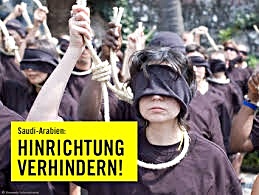 Ashraf Fayadh’s case is not the story of one man, but a symbol for all the victims of a deeply repressive regime that is supported by Western governments who claim to value freedom and democracy above all. Right now Saudi Arabia sits on the UN Human Rights Council, a body whose members are supposedly those who uphold the highest standards of civil liberties. Saudi Arabia is there since 2013 thanks to secret vote-trading deals conducted with the UK, as revealed by Wikileaks. Other Western countries keep weapons and legitimacy streaming towards Saudi Arabia in order to keep oil flowing towards themselves. Caught in the current are ordinary people like Ashraf Fayadh, whose rights go unheeded in the kingdom and abroad.
Ashraf Fayadh’s case is not the story of one man, but a symbol for all the victims of a deeply repressive regime that is supported by Western governments who claim to value freedom and democracy above all. Right now Saudi Arabia sits on the UN Human Rights Council, a body whose members are supposedly those who uphold the highest standards of civil liberties. Saudi Arabia is there since 2013 thanks to secret vote-trading deals conducted with the UK, as revealed by Wikileaks. Other Western countries keep weapons and legitimacy streaming towards Saudi Arabia in order to keep oil flowing towards themselves. Caught in the current are ordinary people like Ashraf Fayadh, whose rights go unheeded in the kingdom and abroad.
Amidst all the recent outrage expressed by Western leaders against IS, in the rhetoric of war and threats of retribution, there has not been a word about Saudi Arabia’s role in helping to promulgate the virulent form of Islam practiced by IS. There is no doubt about the overlaps in their ideology: both certainly endorse lashing or beheading (on the latter front Saudi Arabia actually outdid IS in the last year) anyone who does not share their views.
With this worldwide reading, we demand that the UK and US governments intervene on behalf of Ashraf Fayadh as a first step towards pressuring Saudi Arabia to raise its human rights standards.
We further demand that the United Nations suspend Saudi Arabia from the Human Rights Council until its abysmal record on upholding civil liberties improves.
We also call on Western governments, especially in the UK and the US, to acknowledge the problems inherent in maintaining cozy, unquestioning relations with a country renowned for systematic human rights abuses.
# Website International Literature Festival Berlin 2016
fleursdumal.nl magazine
More in: Archive E-F, Art & Literature News, FDM in Berlin, REPRESSION OF WRITERS, JOURNALISTS & ARTISTS
 Ashraf Fayadh, a 35-year-old poet and artist, is sentenced to be executed by Saudi Arabian authorities for his art. On 17 November, the General Court in Abha, southwest Saudi Arabia, found Ashraf guilty of ‘apostasy’ – renouncing Islam – for his poetry and sentenced him to death.
Ashraf Fayadh, a 35-year-old poet and artist, is sentenced to be executed by Saudi Arabian authorities for his art. On 17 November, the General Court in Abha, southwest Saudi Arabia, found Ashraf guilty of ‘apostasy’ – renouncing Islam – for his poetry and sentenced him to death.
Arrested for poetry and pictures on his phone: Ashraf was initially arrested on 6 August 2013 following a complaint registered against him by another Saudi citizen, who said that the poet was promoting atheism and spreading blasphemous ideas among young people. Ashraf was released the following day, but then rearrested on 1 January 2014, when he was charged with apostasy – he had supposedly questioned religion and spread atheist thought with his poetry. He was at the same time charged with violating the country’s Anti-Cyber Crime Law for allegedly taking and storing photos of women on his phone.
On 30 April 2014, Ashraf was sentenced to four years in prison and 800 lashes for the charges relating to images of women on his phone. The General Court accepted Ashraf’s apology for the charges of apostasy and found the punishment to be satisfactory. However, the court of appeal recommended that Ashraf should still be sentenced for apostasy, and his case was sent back to the General Court, which in turn sentenced him to death for apostasy. Throughout this whole process, Ashraf was denied access to a lawyer – a clear violation of international human rights law, as well as Saudi Arabia’s national laws.
 A death sentence for ‘apostasy’: Apostasy (Riddah, in Arabic) is the renouncing of Islam. Saudi Arabia follows Sharia (Islamic) law, and ‘apostasy’ can be punishable by death. Yet ‘apostasy’ is not a crime – it is a violation of someone’s right to belief or choose our own religion. It should never incur punishment. In addition to that, the death penalty, according to international law, may only be used for the ‘most serious crimes’ (recently interpreted by UN experts to refer to ‘intentional killing’). Apostasy is not a crime at all, let alone a serious one.
A death sentence for ‘apostasy’: Apostasy (Riddah, in Arabic) is the renouncing of Islam. Saudi Arabia follows Sharia (Islamic) law, and ‘apostasy’ can be punishable by death. Yet ‘apostasy’ is not a crime – it is a violation of someone’s right to belief or choose our own religion. It should never incur punishment. In addition to that, the death penalty, according to international law, may only be used for the ‘most serious crimes’ (recently interpreted by UN experts to refer to ‘intentional killing’). Apostasy is not a crime at all, let alone a serious one.
The death penalty is a cruel, inhuman and degrading punishment – it violates our right to life and our right to be free from torture. At Amnesty, we believe the death penalty should never be used.
Quite simply, we’re calling for Ashraf to be freed. He has committed no crime, and as such should not be imprisoned, let alone face execution.
We’re asking the Saudi Arabian authorities to drop Ashraf’s conviction and all charges against him. We’re also asking for them to stop executing anyone for ‘apostasy’.
# Source: Amnesty International website (sign petition!)
fleursdumal.nl digital magazine
More in: Archive E-F, Art & Literature News, POETRY ARCHIVE, REPRESSION OF WRITERS, JOURNALISTS & ARTISTS
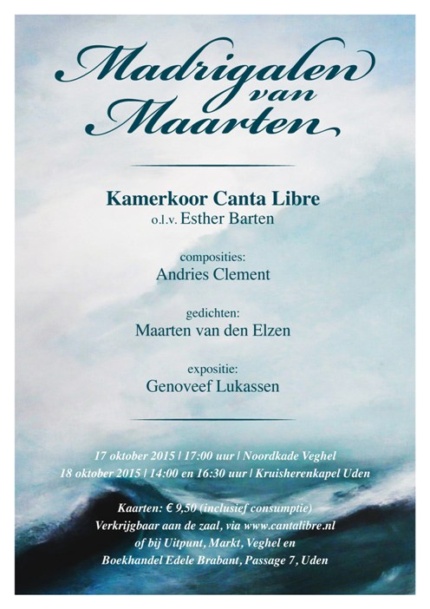
Op 17 en 18 oktober gaat Cantalibre een nieuwe uitdaging aan. Ze gaan de Madrigalen van Maarten van den Elzen vertolken van de Nederlandse componist Andries Clement. In deze voorstelling combineren ze de zangkunst met gedichten van de bekende Udense dichter Maarten van den Elzen. Hij zal werken uit zijn laatste dichtbundel voordragen. Het wordt een beleving waarin muziek en gedichten elkaar versterken.
In de Madrigalen van Maarten zingt Cantalibre 10 gedichten die op muziek gezet zijn door Andries Clement. Voor de kenners de hedendaagse componist die voornamelijk voor á capella koren componeert. Clement begon na zijn carriére als directeur van het Tilburgse conservatorium met het componeren. Zijn composities zijn voor de zangstem gemaakt. De presentatie van de madrigalen is door dirigent Esther Barten op een creatieve manier ingevuld.
Na afloop kunnen de gasten met een glaasje in de hand nog gezellig napraten met elkaar. De expositie van de Udense kunstenares Genoveef Lukassen, draagt daaraan bij.
Canta Libre vertolkt de Madrigalen van Maarten van den Elzen
Er zijn drie voorstellingen:
De premiére vindt plaats op 17 oktober 2015 om 17:00 uur op de Noordkade in Veghel.
Zondag op 18 oktober om 14:00 uur en om 16:30 op in de Kruisherenkapel in Uden.
# Meer informatie op website Cantalibre
fleursdumal.nl magazine
More in: Archive E-F, Art & Literature News, Elzen, Maarten van den, MUSIC, THEATRE
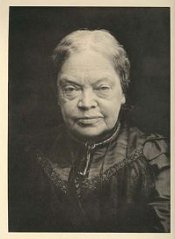
Marie Freifrau von Ebner-Eschenbach
(1830-1916)
Ein kleines Lied
Ein kleines Lied, wie geht’s nur an,
daß man so lieb es haben kann?
Was liegt darin? Erzähle!
Es liegt darin ein wenig Klang,
ein wenig Wohllaut und Gesang
und eine ganze Seele.
Marie Freifrau von Ebner-Eschenbach Gedicht
fleursdumal.nl magazine
More in: Archive E-F, CLASSIC POETRY
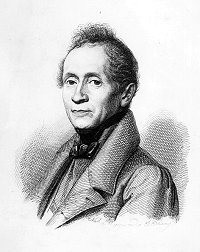
Joseph von Eichendorff
(1788-1857)
Durch! 2
Laß dich die Welt nicht fangen,
Brich durch, mein freudig Herz,
Ein ernsteres Verlangen
Erheb dich himmelwärts!
Greif in die goldnen Saiten,
Da spürst du, daß du frei,
Es hellen sich die Zeiten,
Aurora scheinet neu.
Es mag, will alles brechen,
Die gotterfüllte Brust
Mit Tönen wohl besprechen
Der Menschen Streit und Lust.
Und eine Welt von Bildern
Baut sich da auf so still,
Wenn draußen dumpf verwildern
Die alte Schönheit will.
Joseph von Eichendorff poetry
fleursdumal.nl magazine
More in: Archive E-F, CLASSIC POETRY
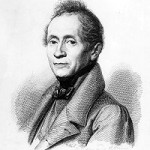
Joseph von Eichendorff
(1788-1857)
Durch!
Ein Adler saß am Felsenbogen,
Den lockt’ der Sturm weit übers Meer,
Da hatt er droben sich verflogen,
Er fand sein Felsennest nicht mehr,
Tief unten sah er kaum noch liegen
Verdämmernd Wald und Land und Meer,
Mußt höher, immer höher fliegen,
Ob nicht der Himmel offen wär.
Joseph von Eichendorff poetry
fleursdumal.nl magazine
More in: Archive E-F, CLASSIC POETRY
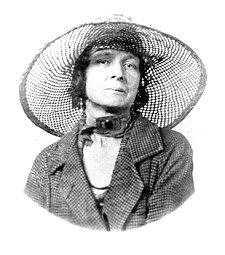
Elsa von Freytag-Loringhoven
(1874 – 1927)
SIMILARITY
CIVIL LAWS PRESSURE BY MEANS OF INTIMIDATION
FOR RETRIBUTION OF “WRONG”
IS BLACKMAILS IDENTICAL ACTION
TO CONINUE VIBRATINGLY GYRATING
EVOLUTION PROCESS’
PERPETUUM MOBILE.
ALL LIFE – SAVAGE – CIVILIZED IS BASED ON
IMMORTAL MOVEMENT
OF FORCE – CONTRAFORCE –
EACH IN RIGHT OF EIXTENCE –
EACH IN HOSTILE RELATIONSHIPS’ FAMILYFEUD –
INTERMINGLING – TO MERGE INTO STATE.
SOCIETY –
UNDERWORLD ACT FROM JUST PRINCIPLE OF
SELF PRESERVATION TO
– IN VAIN –
ANNIHILATE EACH OTHER –
FINALLY TO EMBRACE –
UNEHTICAL –
FOR UTILITY.
ETHICS IS SOCIETY’S AS UNDERWORLD’S
DIPLOMATIC MEANS TO
INSURE SAFETY’ –
EQUALLY ABANDONNED AS SENTIMENTAL SECOND
FOR DYNAMIC PRINCIPALITY:
EXPANSION.
AS FOAVRO SMILES – UNDERWORLD EMERGES SOCIETY UP –
BY REVERSE – SOCIETY PLUNGES UNDER.
SIMILAR METHODS DIFFER ON SURFACE
BY CONVENTIONS’ TIMEIMPOSED
LAWAPPLICATION LEGALIZED BY FORCE – VICTOR –
CRIMINAL – CRIMINAL VICTORIOUS –
RULER BY GRACE OF POWER –
BOMBASTICALLY PROCLAIMING EVERBOYD’S LAW
LAWFUL-L- FOR BUT HIS PARTY.
(MUSSOLINI.)
ALL IS IDENTICAL
PIOUS POMP – SOLEMN MUMMERY – GRACEFUL GESTURE –
RESPLENDENT VARNISH –
HYPOCRITICAL FIDDLESTICKS OF SOCIETY –
AS UNDERWORLD’S UNADORNED HONESTY
BUT THROB OF BASIC PRINCIPLE:
ROTATION.
E.V.F.L
Elsa von Freytag-Loringhoven poetry
fleursdumal.nl magazine
More in: Archive E-F, Dada, Freytag-Loringhoven, Elsa von
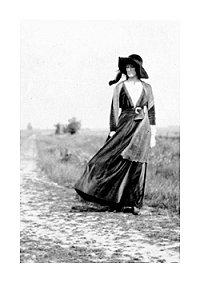
Elsa von Freytag-Loringhoven
(1874 – 1927)
ANCESTRY
ANCESTRY
DAD WAS CORKSCREW
BOTTLE FAIR MA —
CRIED SHE:
“GEE!
THY SPIRAL-LOFTY BRILLIANCY —
SLICK———”
“LET’S HAVE A CORKING TIME”
SNAPPED HE —
PULLED CORK ———
AND —DAMN HIS PRICK
I’VE GOT THAT TURN IN MEc .
E.V.F.L
Elsa von Freytag-Loringhoven poetry
fleursdumal.nl magazine
More in: Archive E-F, Dada, Freytag-Loringhoven, Elsa von
Elsa von Freytag-Loringhoven
(1874 – 1927)
ONLY ADVENTUROUS ARE RICH
ONLY ADVENTUROUS ARE RICH –
RICH ARE ADVENTUROUS.
SOON AS IN STABLE
CULTURES’ TRADITIONS’ SECURITY
THEY
CEASE SO TO BE –
STAGNATIONGERM WORMS
UNDERGROUND PASSAGE
TO OBLIVION.
FLUX
LINDBERGH ONLY COULD SPRING
FROM OBSCURE VASTNESS’ REJUVENATED
VIRGIN SOILS’ FERTILE MIXTURE –
VITALY FOCED
TO EXPLORE ITSELF.
E.V.F.L
Elsa von Freytag-Loringhoven poetry
fleursdumal.nl magazine
More in: Archive E-F, Dada, Freytag-Loringhoven, Elsa von
August Heinrich Hoffmann von Fallersleben
(1798-1874)
Morgenlied
Die Sterne sind erblichen
Mit ihrem güldnen Schein.
Bald ist die Nacht entwichen,
Der Morgen dringt herein.
Noch waltet tiefes Schweigen
Im Thal und überall;
Auf frischbethauten Zweigen
Singt nur die Nachtigall.
Sie singet Lob und Ehre
Dem hohen Herrn der Welt,
Der überm Land und Meere
Die Hand des Segens hält.
Er hat die Nacht vertrieben:
Ihr Kindlein, fürchtet nichts!
Stets kommt zu seinen Lieben
Der Vater alles Lichts.
August Heinrich Hoffmann von Fallersleben poetry
fleursdumal.nl magazine
More in: Archive E-F, Archive G-H, CLASSIC POETRY

Elsa von Freytag-Loringhoven
(1874 – 1927)
CONTRADICTORY SPECULATIONS
CONTRADICTORY SPECULATIONS
ON MY OWN HOOK’S FALLIBILITY
FLUX
MONEY IS SEXENERGY STORED
– AS IS KNOWLEDGE.
COMBINATION: CULTURE.
TIMES HECTIC-PREPATORY BEGET
IMMENSE TURE STIR
– FAKE ABUNDANCE –
CALM:
SIFTING AUTOMACILA FOLLOWS
– INAUGURATING SERENITY
E.V.F.L
Elsa von Freytag-Loringhoven poetry
fleursdumal.nl magazine
More in: Archive E-F, Dada, Freytag-Loringhoven, Elsa von
Thank you for reading Fleurs du Mal - magazine for art & literature